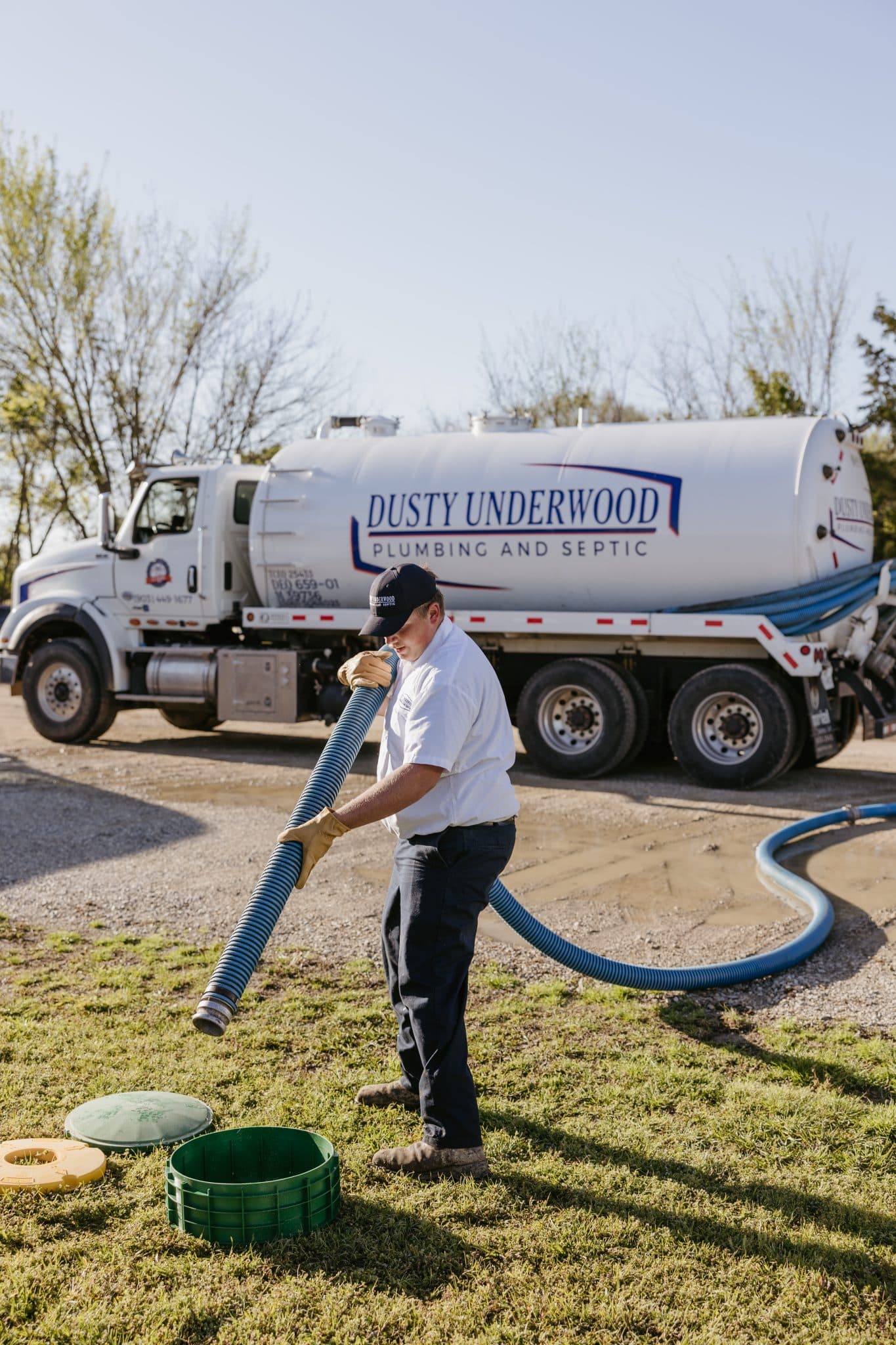How often should you pump your septic tank? It’s a common question, and the truth is, there isn’t a one-size-fits-all answer. Your septic tank pumping schedule depends on factors like tank size, the number of people in your home, and how much water you use every day.
In Bonham and nearby rural areas, private septic systems are common. Keeping up with routine care keeps your plumbing running smoothly and prevents messy backups. Today, we’ll break down the real timing for septic service frequency, how to spot issues, and simple steps that can stretch the time between pumpings.
Septic Pumping At a Glance
- Most households need pumping every 3 to 5 years, but your schedule may differ.
- Household size, tank size, and water use change how often to pump.
- Watch for slow drains, foul odors, pooling water, and backups; these are clear signs your septic tank needs pumping.
- Keep records of service dates and tank inspections to set a reliable schedule.
Why A Fixed Timetable Rarely Works
A blanket rule like “pump every year” or “pump every five years” misses the real factors that affect your tank. The EPA recommends inspecting systems every 1–3 years and pumping most tanks every 3–5 years. That gives you a starting point. Use it, then adjust for your home.
Homes in Bonham that host large families, run frequent laundry loads, or use a garbage disposal fill tanks faster. Older, smaller tanks also need more frequent service. A one-size plan can cost you too much or leave you exposed to failures.
How To Set Your Septic Tank Pumping Schedule
Follow these steps to create a realistic schedule for your property.
- Confirm tank size. Check building records, your closing documents, or ask your last service provider.
- Count occupants and daily water use. More people mean less time between pumpings.
- Note appliances. Frequent dishwasher and laundry use shortens the interval. Garbage disposals add solids.
- Start with 3 years if unsure. For many Bonham households, three years is a safe first interval. Adjust from there based on inspection results.
What To Watch For: Signs Your Septic Tank Needs Pumping
You don’t have to wait for a calendar reminder. Your system will show signs when it needs attention. Look for:
- Slow drains in sinks, tubs, or toilets.
- Gurgling sounds from drains or toilets.
- Foul sewage odors near the house or drain field.
- Pooling water or overly green patches over the drain field, even in dry weather.
- Sewage backups inside the home.
If you spot any of these, call a licensed septic company right away. Small problems can turn into major repairs fast.
Common Myths About Septic Pumping
- Myth: Pump every year to be safe.
Pumping too often can cost extra and may disturb the beneficial bacteria in your tank. Use inspection results to guide frequency. - Myth: Additives fix the need to pump.
Additives do not remove accumulated solids. Only professional pumping removes the solids that build up over time. - Myth: Small tanks never need pumping.
Small tanks fill faster. They may need to be pumped more often than larger tanks.
Practical Steps That Reduce Pumping Frequency
A few daily habits help your system last longer and cut down how often you need to empty the tank.
- Spread out laundry loads instead of running many in one day.
- Fix leaks quickly to avoid extra water through the system.
- Skip the garbage disposal or use it sparingly.
- Do not flush wipes, grease, or non-biodegradable items.
- Protect the drain field: do not park vehicles or build structures over it.
- Schedule inspections every 1–3 years so a tech can recommend the right pumping interval.
How Inspections Help You Save Money
Inspections show sludge and scum levels before they cause damage. A professional can measure solids and tell you exactly when to empty your septic tank. That precision protects your drain field and prevents costly replacements. Keep every service record. It makes future scheduling simple and helps when you sell the house.
Frequently Asked Questions About Septic Tank Pumping
How long does septic pumping take?
Most standard pumps take about 1–2 hours, depending on tank size and access.
Can heavy rain change my septic pumping schedule?
Yes. Saturated ground slows field drainage. After heavy rains, your system may need attention sooner.
Who should I call in Bonham for septic tank service?
Pick a licensed septic pumper with local reviews and proper insurance. Local providers know county rules, typical soils, and common installation layouts around Bonham.
Keeping Your Septic Tank in Good Condition
Once you learn the needs of your septic tank, keeping it working well is simple. A good septic tank pumping schedule starts with the EPA baseline of every 3–5 years and then fits your tank size, family, and water use. Watch for signs your septic tank needs pumping and schedule inspections so you can avoid bigger problems. Keep clear records and work with a local pro like Underwood Plumbing who understands Bonham’s needs.
Keep Your Septic System Healthy—Call Dusty Underwood Plumbing & Septic
Don’t leave your septic system to chance. Regular maintenance keeps your home safe, clean, and worry-free. Dusty Underwood Plumbing & Septic makes it easy for Bonham homeowners to stay on top of their pumping schedule. Call today at 903-326-7172 or book your septic service online to keep your tank running like it should year-round.

